A leading Irish cellist, Gerald Peregrine has played all over the world.
From Carnegie Hall in New York to the National Centre for Performing Arts in Beijing and Tchaikovsky Hall in Moscow, he’s been up there with top musicians.
However, the most rewarding work he’s done to date was not in a huge concert hall on the other side of the world. It was at home in Ireland, outside windows.
Gerald is the co-founder Mobile Music Machine, which initially ran music workshops in schools.
During the pandemic, they started playing classical music concerts for residents of care homes and hospitals.
Speaking with Irish Country Living, Gerald recounts many anecdotes from these concerts.
It’s deeply emotional work
One particularly striking one is when a woman who hadn’t verbally communicated in six months, spoke to a nurse during one of the performances.
“It’s deeply emotional work,” Gerald says. “I’ve toured the world performing and playing with many big artists, but this is probably the most rewarding work I’ve done, because it feels meaningful and purposeful.
“I do feel there’s a responsibility on an artist to play a role during times like this when people are in need or healing; in need of distraction or in need of continuity of culture. All of these things that make life worth living.”
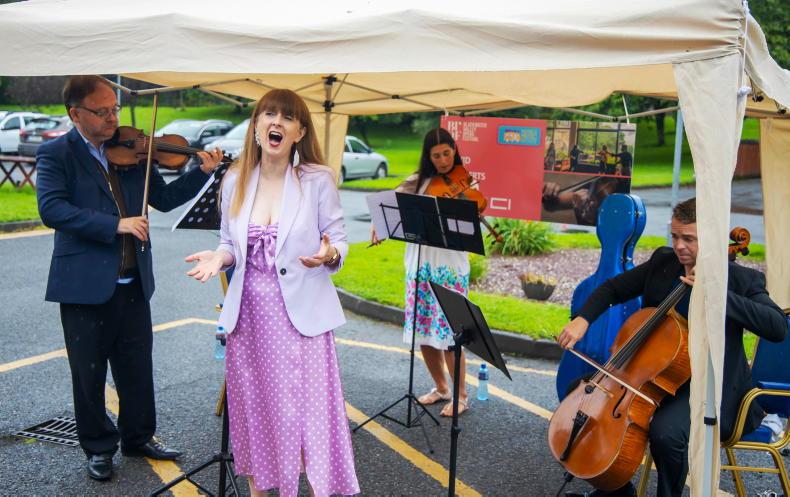
Paul O'Hanlon, violin; Sandra Oman, Saprano; Andreea Banciu, viola and Gerald Peregrine, Cello; at St Carthage's House, nursing home, Lismore, Co Waterford where the Mobile Music Machine played to staff and residents. \ Patrick Browne
In the winter months the musicians braved the elements outside while residents listened through windows. As the weather got better and vaccination ramped up, the residents were able experience the concerts outside.
When it comes to musicians to join him playing the concerts, Gerald says he has had “the pick of the choice”, as all musicians were in the same boat and many were delighted to get live work. The Covid Care Concerts have featured Celine Byrne, Iarla Ó Lionáird, Claudia Boyle, Sibéal and Seán Keane perform, to name a few.
A new direction
Gerald is from a big musical family. He started playing the violin at three, followed by the cello at six.
I was watching a lot of musicians going online with their work. That didn’t appeal to me personally
From Dublin, at the age of 14 he began commuting to London twice a week for music lessons, before going on to study at the Royal College of Music there at 18.
Gerald had just returned from touring in the US in March 2020 when lockdown struck. He spent two months trying to make sense of the situation – like very many people – before beginning to think about what avenues were out there for his music.
“I was watching a lot of musicians going online with their work. That didn’t appeal to me personally, because the thrill is in the live performance for me. Around May I was thinking, ‘What I could do to be useful?’” Gerald recalls.
“Then the neighbours were asking me to do a garden concert for them. I agreed to do that and I saw it really helped to lift their spirits after the two months of lockdown. I got some of my friends together and we went up to St John of God Hospital. We did two free concerts up there for the service users. It was lovely, it was a summer day. It was such a great feeling of release for everybody and a sense of connection.”
This, however, was not Gerald’s first time playing at a care home.
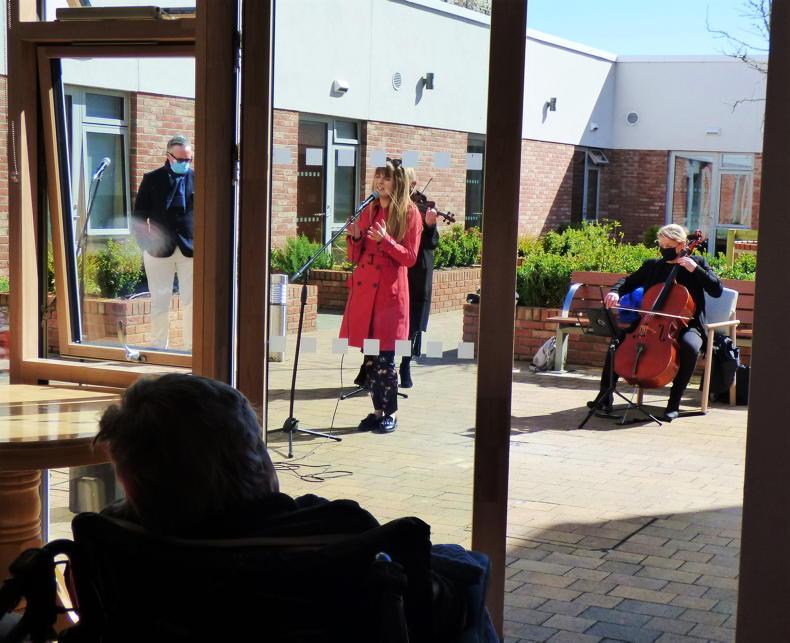
Gavan Ring, tenor; Sandra Oman, soprano; Katie O'Connor, violin and Paula Hughes, Cello; performing at a Covid Care Concert.
“We’ve always done care home concerts as part of our work around the country. It’s been something I’ve done for a long time. Actually, the first care home concert I did was when I was 11 in New York with my uncle Frank Patterson the tenor.
The ethos that has grown around the concerts is equality of access to the arts
“I remember it so clearly, because he dressed us up to the nines to go into this care home and it was a really lovely experience. It’s always been part of my work whenever I’ve time to pop in and do something.”
Access to the arts
As with his work in schools, access to the arts is something Gerald is big on. He believes that everyone should be able to enjoy and be enriched by the arts, regardless of their age, location or health.
“The ethos that has grown around the concerts is equality of access to the arts.
He was in tears after it
“To tell you one story: there was a man in Waterford where we played and sang some opera. It must be a strange thing, you’re in the middle of lockdown and someone is singing Puccini outside your window at 12 noon.
“He was in tears after it, because all his life he listened to that music on the radio and he said, ‘My biggest regret was that I thought I was going to go to the grave without hearing it live. You’ve made me so happy.’ We said, ‘Well, why didn’t you ever go to the concerts?’ He said, ‘I was told it wasn’t for me.’”
The Covid Care Concerts were initially a pilot project funded by the HSE. As of April of this year Mobile Music Machine had provided 400 care home concerts around the country.
In 2021, they’re aiming to deliver a further 250 concerts with the support of Age Friendly Ireland and Healthy Ireland as part of the Government’s Keep Well Campaign.
Gerald feels this project will transcend the pandemic and in the future he hopes nationalise this programme in partnership with the HSE.
A leading Irish cellist, Gerald Peregrine has played all over the world.
From Carnegie Hall in New York to the National Centre for Performing Arts in Beijing and Tchaikovsky Hall in Moscow, he’s been up there with top musicians.
However, the most rewarding work he’s done to date was not in a huge concert hall on the other side of the world. It was at home in Ireland, outside windows.
Gerald is the co-founder Mobile Music Machine, which initially ran music workshops in schools.
During the pandemic, they started playing classical music concerts for residents of care homes and hospitals.
Speaking with Irish Country Living, Gerald recounts many anecdotes from these concerts.
It’s deeply emotional work
One particularly striking one is when a woman who hadn’t verbally communicated in six months, spoke to a nurse during one of the performances.
“It’s deeply emotional work,” Gerald says. “I’ve toured the world performing and playing with many big artists, but this is probably the most rewarding work I’ve done, because it feels meaningful and purposeful.
“I do feel there’s a responsibility on an artist to play a role during times like this when people are in need or healing; in need of distraction or in need of continuity of culture. All of these things that make life worth living.”

Paul O'Hanlon, violin; Sandra Oman, Saprano; Andreea Banciu, viola and Gerald Peregrine, Cello; at St Carthage's House, nursing home, Lismore, Co Waterford where the Mobile Music Machine played to staff and residents. \ Patrick Browne
In the winter months the musicians braved the elements outside while residents listened through windows. As the weather got better and vaccination ramped up, the residents were able experience the concerts outside.
When it comes to musicians to join him playing the concerts, Gerald says he has had “the pick of the choice”, as all musicians were in the same boat and many were delighted to get live work. The Covid Care Concerts have featured Celine Byrne, Iarla Ó Lionáird, Claudia Boyle, Sibéal and Seán Keane perform, to name a few.
A new direction
Gerald is from a big musical family. He started playing the violin at three, followed by the cello at six.
I was watching a lot of musicians going online with their work. That didn’t appeal to me personally
From Dublin, at the age of 14 he began commuting to London twice a week for music lessons, before going on to study at the Royal College of Music there at 18.
Gerald had just returned from touring in the US in March 2020 when lockdown struck. He spent two months trying to make sense of the situation – like very many people – before beginning to think about what avenues were out there for his music.
“I was watching a lot of musicians going online with their work. That didn’t appeal to me personally, because the thrill is in the live performance for me. Around May I was thinking, ‘What I could do to be useful?’” Gerald recalls.
“Then the neighbours were asking me to do a garden concert for them. I agreed to do that and I saw it really helped to lift their spirits after the two months of lockdown. I got some of my friends together and we went up to St John of God Hospital. We did two free concerts up there for the service users. It was lovely, it was a summer day. It was such a great feeling of release for everybody and a sense of connection.”
This, however, was not Gerald’s first time playing at a care home.

Gavan Ring, tenor; Sandra Oman, soprano; Katie O'Connor, violin and Paula Hughes, Cello; performing at a Covid Care Concert.
“We’ve always done care home concerts as part of our work around the country. It’s been something I’ve done for a long time. Actually, the first care home concert I did was when I was 11 in New York with my uncle Frank Patterson the tenor.
The ethos that has grown around the concerts is equality of access to the arts
“I remember it so clearly, because he dressed us up to the nines to go into this care home and it was a really lovely experience. It’s always been part of my work whenever I’ve time to pop in and do something.”
Access to the arts
As with his work in schools, access to the arts is something Gerald is big on. He believes that everyone should be able to enjoy and be enriched by the arts, regardless of their age, location or health.
“The ethos that has grown around the concerts is equality of access to the arts.
He was in tears after it
“To tell you one story: there was a man in Waterford where we played and sang some opera. It must be a strange thing, you’re in the middle of lockdown and someone is singing Puccini outside your window at 12 noon.
“He was in tears after it, because all his life he listened to that music on the radio and he said, ‘My biggest regret was that I thought I was going to go to the grave without hearing it live. You’ve made me so happy.’ We said, ‘Well, why didn’t you ever go to the concerts?’ He said, ‘I was told it wasn’t for me.’”
The Covid Care Concerts were initially a pilot project funded by the HSE. As of April of this year Mobile Music Machine had provided 400 care home concerts around the country.
In 2021, they’re aiming to deliver a further 250 concerts with the support of Age Friendly Ireland and Healthy Ireland as part of the Government’s Keep Well Campaign.
Gerald feels this project will transcend the pandemic and in the future he hopes nationalise this programme in partnership with the HSE.





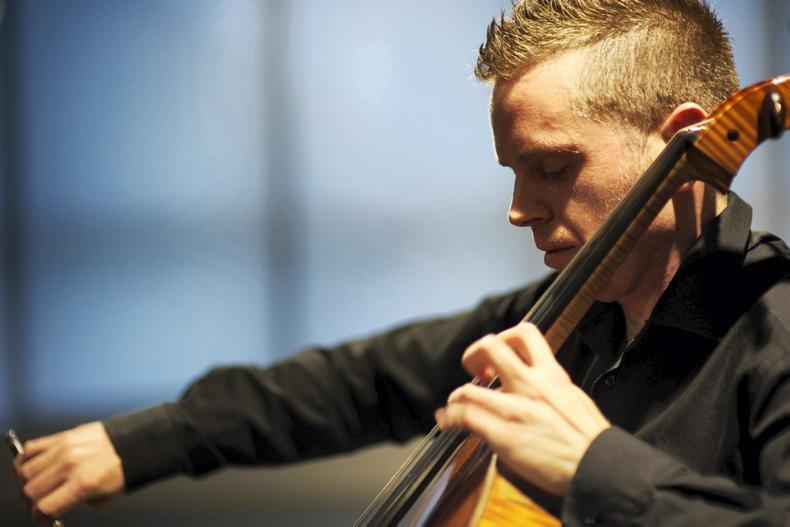

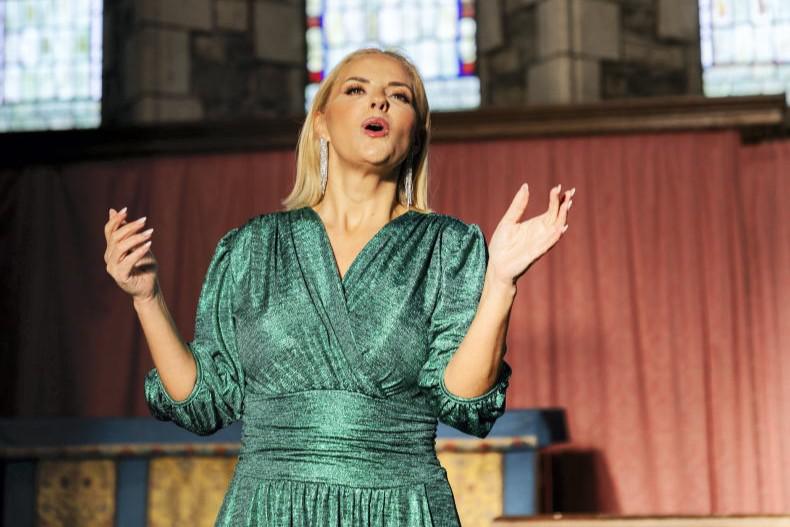

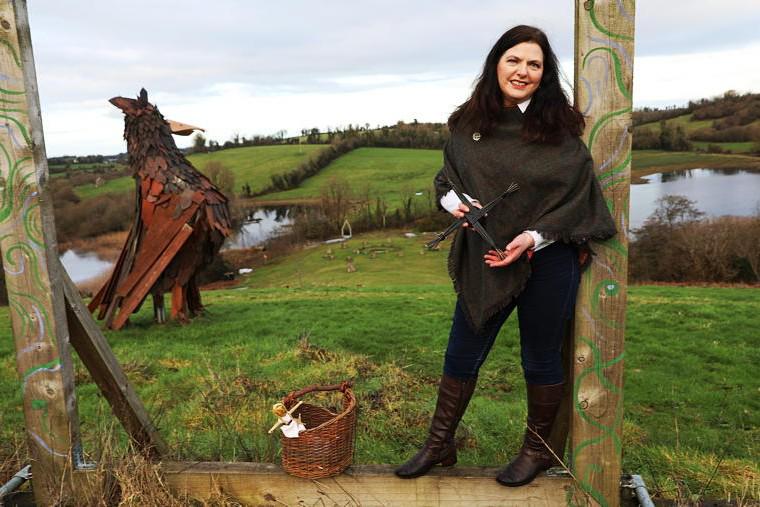

SHARING OPTIONS